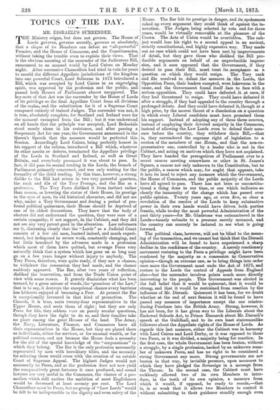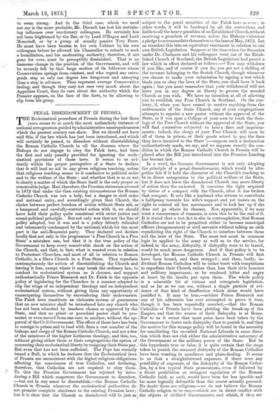TOPICS OF THE DAY.
MR. DISRAE.LI'S SUR]IENDER.
THEMinistry reigns, but does not govern, The House of Lords governs, governs secretly, governs so absolutely, that a clique of its Members can defeat an "all-powerful"
Premier, and the House of Commons, and the Constituencies, without taking the trouble even to explain their views. That is the obvious meaning of the surrender of the Judicature Bill, announced to an amused world by Lord Cairns on Monday night. After successive Chancellors had tried in vain for years to mould the different Appellate jurisdictions of the kingdom into one powerful Court, Lord Selborne in 1873 introduced a Bill, which was accepted by Lord Cairns in an ungrudging spirit, was approved by the profession and the public, and passed both Houbes of Parliament almost unopposed. The key-note of that Act was the surrender by the House of Lords of its privilege as the final Appellate Court from all divisions of the realm, and the substitution for it of a Supreme Court composed entirely of trained Judges. The surrender was not, it
is true, absolutely complete, for Scotland and Ireland were for the moment exempted from the Bill; but it was understood on all hands that the principle was accepted, Lord Redesdale stood nearly alone in his resistance, and after passing a Suspensory Act for one year, the Government announced in the Queen's Speech that the measure would be perfected this Session. Accordingly Lord Cairns, being perfectly honest in his support of the reform, introduced a Bill which, whatever its other merits or defects, terminated the Appellate privilege of the Lords in Scotland and Ireland, as well as Great Britain, and everybody presumed it was about to pass. In fact, it did pass its second reading in the Lords, the branch of Parliament primarily concerned, and was only waiting for the formality of the third reading. By this time, however, a strong dislike to the Bill had arisen in two very powerful quarters, the rank and file of the Tory Peerage, and the Bar as a profession. The Tory Peers disliked it from instinct rather than reason, as lowering the status of their House, its prestige in the eyes of men, its old historical character, and did not see why, under a Tory Government and during a period of pro- found political quiescence, their House should be deprived of one of its oldest decorations. They knew that the body of electors did not understand the question, they were sure of a certain sympathy, if not support, in the Cabinet, an,d they did not see any very patent good in the alteration. Law reformers see it, discerning clearly that the "Lords" as a Judicial Court consists of a few old men, learned indeed, and much experi- enced, but indisposed to severe work, constantly changing, and but little benefited by the advances made in a profession which most of them have quitted, but average Peers very naturally think that a system which has gone on so long may go on a few years longer without injury to anybody. The Tory Peers, therefore, were quite ready, if they saw a chance, to withdraw the concession they had made, and the chance suddenly appeared. The Bar, after two years of reflection, disliked the innovation, and from the Trade Union point of view with some reason. It gravely diminishes what has been termed, by a gross misuse of words, the "grandeur of the Law," that is to say, it destroys the exceptional chance every barrister has hitherto enjoyed of becoming a Peer. At present the Bas- is exceptionally favoured in that kind of promotion. The Church, it is true, seats twenty-four representatives in the Upper House, and seats them of right ; but they are only Peers for life, they seldom vote on purely secular questions, though they have the right to do so, and their families take no place among the great Houses of the land. The Army, the Navy, Literature, Finance, and Commerce have all their representatives in the House, but they are placed there as individuals, either for services, or for unusual wealth, or for political reasons, and not because the House feels a necessity for the aid of the special knowledge of the "corporations" to which they belong. The Bar is the only profession necessarily represented by men with hereditary titles, and the necessity for selecting them would cease with the creation of an outside Court of Supreme Appeal. The highest Judges would not necessarily be Peers, and as the profession does not now yield the comparatively great fortunes it once produced, and sound lawyers are very useful in the Commons, the chance of a pro- motion which still excites the ambition of most Englishmen would be decreased at least seventy per cent. The Lord Chancellors must be Peers, but no group of "Law Lords" would be felt to be indispensable to the dignity and even safety of the House. The Bar felt its prestige in danger' and its spokesmen raked up every argument they could tnk hi of against the in-
novation. The Judges, being selected by rob and for three years, would be virtually removable at the pleasure of the
Crown. The Acts of Union would be overridden. The sub- ject would lose his right to a second appeal in an ancient,
strictly constitutional, and highly expensive way. They made out no ease which could not have been met by improvements of detail, but they gave those who disliked the Bill pro- ducible arguments on behalf of an unpreducible impres-
sion, and. it soon appeared that the Government, if they desired to pass their Bill, must treat its a.ceeptarie.e as a-
question on which they would resign. The Tory rank and file resolved to defeat the measure in the Lords, the Opposition Peers, their leaders excepted, were lukewarm in the
cause, and the Government found, itself face to face with a serious opposition. They could have deleated it at once, if they had threatened to resign. They could have defeated it after a struggle, if they had appealed to the country through a prolonged debate. And they could have defeated it, though at a high price, by the merest threat of a dissolution on a question in which every Liberal candidate, must have. promised them his support. Instead of adopting any of these three courses, instead of employing their devoted majority in the Commons, instead of allowing the Law Lords even to defend their mea- sure before the country, they withdrew their Bill,—that is, they surrendered the supreme right of legislation to a section of the members of one House, and that the non-re- presentative one, controlled by a leader who is not in the Cabinet, and acting on motives which they have not explained. They have handed the prerogatives of: Parliament over to a secret caucus meeting somewhere or other in St. James's Square, a caucus not only unknown to the Constitution, but to the public, a caucus which may, for aught that appears, take it into its head to reject any measure which the Government,. the House of C011111101213, and the public majority of the Lords. have all agreed to pass. There has not been so unconstitu- tional a thing done in our time, or one which indicates so. clearly the immensity of the change which has passed over public opinion. Twenty years ago or even five, so clear a revelation, of the resolve of the Lords to keep substantive power in their own hands would have driven both parties frantic, while to-day the most powerful Administration of the past thirty years—for. Mr. Gladstone was outnumbered in the Lords-tamely submits to a pressure merely menaced, and. the country can scarcely be induced to see what is going forward.
The political class,,however, will not be blind to the mean- ing of the transaction, and we cannot but think that the Disraeli Administration will be found to have experienced a sharp decline in the confidence of the country. A merely reactionary movement restoring to the Peers a privilege might have been condoned by the majority-as a concession to- Conservative opinion—though an extreme one, as to bring-things into order once more the,Goverrunent must undo the Act of 1873, and restore to the Lords the control of Appeals from England. also—but the surrender involves points much more directly interesting to the people. This Government was elected in. the full belief, that it would be quiescent, that it would be strong, and that it would be restrained from reaction by the influence of Mr. Disraeli. Quiescent it has been, for we doubt whether at the end of next Session it will be found to have passed any measure of importance except the one reintro- ducing Purchase into the British Army. Strong, however, it has not been, for it has given way to the Liberals about the Endowed Schools Act, to Prince Bismarck about Mr. Disraeli's speech at the Guildhall, and to its own least statesmanlike followers about the Appellate rights of the House of Lords. As regards this last measure, either the Cabinet was in harmony with Lord Cairns and Lord Derby, or it was opposed to those two Peers, or it was divided, a majority being for reaction. In the first case, the whole Government has been beaten, without a struggle, by a single profession, backed by an unknown num- ber of unknown Peers, and has no right to be considered a strong Government any more. Strong governments are not beaten in that way, by invisible pressure, upon me-J.:rums to which they have pledged the Sovereign in a message from. the Throne. In the second ease, the Cabinet must have recklessly allowed two of its own Members to intro- duce, in the teeth of its own opinion, a measure from which it would, if opposed, be ready to recede,—that is, is so weak that it allows two Members to control it without submitting to their guidance steadily enough even
to seem- strong. And in the third case, which we need not say is the more probable, Mr. Disraeli has lost his restrain- ing influence over reactionary colleagues. He certainly has not been frightened by the Bar, or by Lord O'Hagan and Lord Moncrieff, or by a. group of usually passive Tory Peers. He must have been beaten in his own Cabinet by his own colleagues before he allowed his Chancellor to submit to such a humiliation, and his moderating authority, therefore, if not gone for ever, must be perceptibly diminished. That is an immense change in the position of the Government, and will be severely felt by that large section of its followers whose Conservatism springs from content, and who regard any retro- grade step as only one degree less dangerous and annoying than a step in advance. They represent average Conservative feeling, and though they may not care very much about the Appellate Court, they do care about the authority which the Premier appears, on the face of the facts, to be allowing to slip from his grasp.



































 Previous page
Previous page